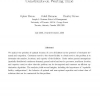Free Online Productivity Tools
i2Speak
i2Symbol
i2OCR
iTex2Img
iWeb2Print
iWeb2Shot
i2Type
iPdf2Split
iPdf2Merge
i2Bopomofo
i2Arabic
i2Style
i2Image
i2PDF
iLatex2Rtf
Sci2ools
115
click to vote
MSOM
2008
2008
Facility Location with Stochastic Demand and Constraints on Waiting Time
We analyze the problem of optimal location of a set of facilities in the presence of stochastic demand and congestion. Customers travel to the closest facility to obtain service; the problem is to determine the number, locations, and capacity of the facilities. Under rather general assumptions (spatially distributed continuous demand, general arrival and service processes, non-linear location and capacity costs) we show that the problem can be decomposed and construct an efficient optimization algorithm. The analysis yields several insights, including the importance of "equitable facility configurations", the behavior of optimal and near-optimal capacities and robust class of solutions that can be constructed for this problem.
Related Content
| Added | 28 Dec 2010 |
| Updated | 28 Dec 2010 |
| Type | Journal |
| Year | 2008 |
| Where | MSOM |
| Authors | Opher Baron, Oded Berman, Dmitry Krass |
Comments (0)

